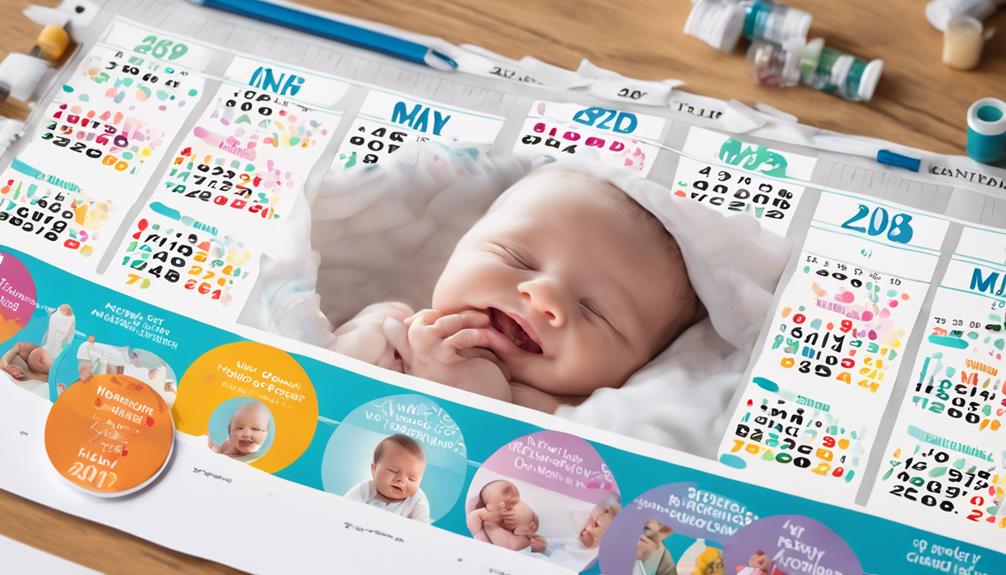When taking care of newborns, it is important not to overlook essential tips related to infection risks.
Ensuring the safety and well-being of our little ones is a top priority, and being equipped with the right knowledge can make a significant difference.
From understanding the importance of hand hygiene to recognizing early signs of infection, these essential tips can be the key to safeguarding your newborn's health.
Key Takeaways
- Proper hand hygiene reduces infection transmission.
- Monitoring newborns for signs of infection is crucial.
- Breastfeeding boosts newborn immunity against infections.
- Early recognition and intervention prevent complications in newborn infections.
Importance of Hand Hygiene
Highlighting the critical role of hand hygiene in preventing infections, especially in vulnerable newborns, is essential for ensuring their health and well-being. Newborn care plans must prioritize proper hand-washing techniques to reduce the risk of infections. Healthcare providers play an important role in maintaining hand hygiene to safeguard newborns from harmful microorganisms. When soap and water aren't readily available, alcohol-based sanitizers are effective alternatives for disinfection.
Effective hand hygiene compliance greatly reduces the transmission of infections in healthcare settings, making it a cornerstone of newborn care. Ensuring that healthcare providers sanitize their hands before and after caring for newborns is crucial in minimizing the risk of infections. By following proper hand hygiene protocols, healthcare professionals contribute to creating a safe environment for newborns, promoting their health and overall well-being.
Recognizing Common Signs of Infection

Effective newborn care involves recognizing common signs of infection, which are important indicators of the infant's health status and require prompt attention to prevent complications.
In newborns, signs and symptoms of infection can manifest in various ways, such as fever, poor feeding, lethargy, irritability, and changes in skin color or appearance. Additionally, infections may present with respiratory distress, vomiting, diarrhea, jaundice, or a rash.
It's essential to be vigilant for signs like unusual crying patterns, difficulty breathing, unusual body movements, or a bulging fontanelle, as these could indicate an underlying infection.
Furthermore, infections in newborns can lead to impaired gas exchange, poor weight gain, low body temperature, excessive fussiness, or challenges in maintaining body temperature within normal limits.
Regular monitoring and quick action are paramount in nursing care plans to address any signs of infection promptly and support the newborn's immune system to prevent further complications.
Creating a Clean Environment
To maintain a safe and hygienic environment for newborns, it's essential to implement proper cleaning protocols and minimize potential sources of contamination. Clean surfaces play an important role in infection control, reducing the risk of illnesses for the delicate newborn skin. Regularly disinfecting commonly touched areas such as countertops, doorknobs, and toys helps prevent the spread of germs.
Using fragrance-free, hypoallergenic laundry detergent for the baby's clothes and bedding can also minimize skin irritants. Additionally, keeping pets away from the baby's sleeping and play areas is critical to prevent exposure to pet dander and potential germs. It's important to avoid harsh chemicals that could irritate the baby's sensitive skin or respiratory system.
Maintaining a smoke-free environment is equally important since secondhand smoke exposure increases the risk of respiratory infections in newborns. By creating a clean and healthy environment, we can reduce the chances of infections and promote the well-being of our little ones.
Understanding Newborn Vaccination Schedule

When considering the immunization of newborns, adherence to the recommended vaccination schedule is paramount for safeguarding infants against serious diseases. The CDC and WHO establish newborn vaccination schedules to protect infants from illnesses like DTaP, Hepatitis B, Hib, Rotavirus, and PCV. These vaccines are administered in multiple doses according to specific timelines, ensuring best protection during vulnerable periods in a baby's early life.
Following the prescribed vaccination schedule not only helps build immunity in newborns but also greatly reduces the risk of infections. It's essential to discuss the vaccination schedule with healthcare providers to guarantee timely and appropriate immunizations for newborns.
- Newborn vaccination schedules set by health authorities like the CDC and WHO
- Vaccines such as DTaP, Hepatitis B, Hib, Rotavirus, and PCV given in multiple doses
- Following the recommended schedule helps build immunity and reduce infection risks
Proper Handling of Newborn's Umbilical Cord
Maintain cleanliness and dryness of the newborn's umbilical cord to prevent infections, necessitating gentle care and monitoring for signs of complications. The umbilical cord serves as an essential link between the baby and the placenta during pregnancy, making it susceptible to infection if not properly cared for. To reduce the risk of developing infections, avoid submerging the baby in water until the cord naturally falls off, typically within 1-3 weeks after birth.
During baths, use a gentle soap to clean around the base of the cord, ensuring it remains dry and clean. Monitor the cord for any signs of infection, such as redness, swelling, or discharge, which could indicate a need for medical attention. Newborns have a developing immune system, making proper infection control and hand hygiene vital.
Managing Visitors and Social Interactions

Limiting the number of visitors and enforcing strict hand hygiene protocols are essential measures in reducing the risk of infections in newborns during social interactions. Newborns have underdeveloped immune systems, making them more susceptible to infections from social interactions.
To manage visitors and social interactions effectively, consider the following:
- Educate Visitors: Inform visitors about the importance of proper hand hygiene before touching the baby to prevent the spread of germs.
- Set Strict Guidelines: Implement rules for visitors, such as avoiding contact if they're feeling unwell or have been exposed to contagious illnesses.
- Monitor Visitors: Regularly remind and supervise visitors to make certain they adhere to the established protocols to maintain a healthy environment for the newborn.
Monitoring Baby's Temperature
Monitoring the baby's temperature is a critical aspect of early infection detection in newborns due to their limited ability to regulate body temperature. A newborn's normal temperature typically ranges from 97.7 to 99.4 degrees Fahrenheit, and any deviations from this range should be promptly addressed. To effectively monitor the baby's temperature, using a digital thermometer under the baby's arm is a safe and accurate method. Fever in a newborn, especially those under 4-6 weeks old, is considered an emergency and requires immediate medical attention to prevent complications.
| Temperature Ranges | Action Required |
|---|---|
| 97.7°F – 99.4°F | Normal |
| Below 97.7°F | Monitor closely, consider consulting a healthcare provider |
| Above 99.4°F | Seek immediate medical attention |
| 100.4°F or higher | Emergency, seek medical help urgently |
Regular temperature monitoring is essential for identifying potential infections early and ensuring appropriate interventions are implemented promptly to safeguard the newborn's health.
Breastfeeding Benefits for Immune System

Breastfeeding equips newborns with important antibodies and nutrients that fortify their immune system, providing essential protection against infections.
Colostrum, the initial milk produced post-birth, is particularly rich in antibodies that serve as a shield for infants.
Additionally, breast milk is a powerhouse of immunoglobulins, white blood cells, and enzymes that actively combat harmful bacteria and viruses, contributing to the overall health and resilience of the baby.
Breast Milk Antibodies
Within breast milk, a rich array of antibodies stands as an essential element that fortifies the newborn's immune system from the very start. These breast milk antibodies provide passive immunity, offering protection against respiratory infections, gastrointestinal infections, and other illnesses. Breastfeeding not only helps reduce the risk of infections but also supports the baby's evolving immune needs.
The composition of breast milk adjusts to meet the newborn's changing requirements, aiding in the development of a robust immune system. Additionally, breast milk promotes the growth of beneficial bacteria in the baby's gut, fostering a healthy microbiome that further boosts immunity. This natural defense mechanism plays a critical role in safeguarding the baby's health and well-being.
Boost Baby's Immunity
Moving from the protective shield of breast milk antibodies, we now highlight how breastfeeding enhances the newborn's immune system under the subtopic 'Boost Baby's Immunity.'
Breastfeeding plays a vital role in boosting the baby's immunity by providing essential antibodies and nutrients. Colostrum, the initial breast milk, is rich in antibodies that shield newborns from infections. Research shows that breastfed babies have reduced rates of respiratory infections, ear infections, and gastrointestinal illnesses.
Additionally, breast milk contains beneficial bacteria that support the development of a healthy gut microbiome, further strengthening the baby's immune defenses. Opting for exclusive breastfeeding for the first 6 months greatly lowers the risk of infections in newborns, ensuring a strong and healthy gut for ideal immune function.
Protection Against Infections
With a rich array of antibodies and essential nutrients, newborns are fortified against infections through the protective shield of breast milk. Breastfeeding provides newborns with colostrum, rich in antibodies that protect against infections. Additionally, breast milk contains white blood cells that actively combat bacteria and viruses, further enhancing the newborn's immune system.
Opting for exclusive breastfeeding for the first six months greatly reduces the risk of infections in babies, offering them a strong defense mechanism. Beyond physical health benefits, breastfeeding fosters bonding between the newborn and the mother, promoting emotional well-being and a sense of security. This intimate connection established through breastfeeding not only strengthens the baby's immune system but also nurtures their overall well-being.
Seeking Prompt Medical Attention

Recognizing the warning signs of infection in newborns is a critical aspect of seeking prompt medical attention. As healthcare professionals, we emphasize the importance of early diagnosis to guarantee timely intervention.
Any concerning symptoms, particularly in newborns under 4-6 weeks old, should never be ignored and warrant immediate medical evaluation to prevent complications.
Early Diagnosis Importance
Early detection of infections in newborns plays a critical role in ensuring prompt medical intervention and improved outcomes. For newborns, early diagnosis is important in managing infections effectively. Here are key points to take into account:
- Timely Medical Attention: Seeking prompt medical attention upon noticing any signs of infection is essential.
- Healthcare Provider Involvement: Involving healthcare providers early allows for timely diagnosis and appropriate treatment initiation.
- Preventing Complications: Early identification of symptoms can help prevent complications and guarantee the newborn's health is safeguarded.
Ensuring early diagnosis of infections in newborns is fundamental for their well-being and can significantly impact their overall health outcomes.
Recognizing Warning Signs
Upon noticing warning signs such as a fever over 100.4°F or signs of infection in a newborn, seeking prompt medical attention is essential for their well-being. Newborns are vulnerable to infections, and it is important to recognize warning signs like poor feeding, lethargy, difficulty breathing, rash, and jaundice to guarantee timely intervention. Immediate medical evaluation should be sought for any unusual symptoms like persistent vomiting or changes in behavior in newborns. To help you recognize these warning signs better, refer to the table below:
| Warning Signs | Description |
|---|---|
| Poor feeding | Difficulty in nursing or bottle feeding. |
| Lethargy | Unusual lack of energy or alertness. |
| Difficulty breathing | Struggling or labored breathing. |
Building a Support System for Parents

To effectively support parents during the newborn care period, establishing a robust network of resources and connections is essential. Building a strong support system can greatly reduce stress and anxiety levels for parents as they navigate the challenges of caring for a newborn. Encouraging open communication with healthcare providers fosters a collaborative approach to newborn care, ensuring that parents receive the guidance and support they need. Connecting parents with local community resources and support groups not only provides valuable information but also creates a sense of belonging and empowerment.
- Encourage Open Communication: Enhance the quality of care by promoting transparent and effective communication between parents and healthcare providers.
- Connect with Community Resources: Link parents with local support groups and resources to provide them with additional knowledge and assistance in caring for their newborn.
- Offer Emotional Support: Providing reassurance and emotional support can help parents feel more confident in handling the challenges of newborn care.
Frequently Asked Questions
What Is the Nurse's Responsibility in Preventing Infections in the Newborn?
We guarantee newborn infection prevention by promoting hand hygiene, advocating for vaccinations, monitoring visitors for illness, and limiting public exposure. Our role is vital in safeguarding newborns from infections, emphasizing proactive measures for their well-being.
What Is Essential Care for Newborn Health?
Maintaining normal body temperature, vital signs, and immune defenses is important for newborn health. Close monitoring of these indicators, along with educating caregivers on infection prevention, helps minimize infection risk and guarantees early detection and intervention.
What Are the Nursing Care Plan of Neonatal Sepsis?
We focus on maintaining normal body temperature and critical signs, along with early detection, antibiotics, and fluid therapy. Premature birth, maternal GBS colonization, and poor weight gain increase risk. Complications can be severe, especially in vulnerable newborns.
How Do You Manage a High Risk Baby Under Infection Prevention?
In handling a high-risk baby under infection prevention, we meticulously monitor important signs, conduct regular assessments, and implement isolation precautions. Educating caregivers on hand hygiene, visitor limits, and vaccinations is essential for protecting vulnerable infants.
Conclusion
To conclude, practicing proper infection prevention protocols is paramount for protecting our precious newborns.
By prioritizing hand hygiene, recognizing signs of infection, and maintaining a clean environment, we can guarantee the health and well-being of our little ones.
Remember, seeking prompt medical attention, monitoring temperatures, and building a strong support system are key components of a successful infection risk care plan.
Let's stay vigilant and dedicated to safeguarding our newborns from harm.









